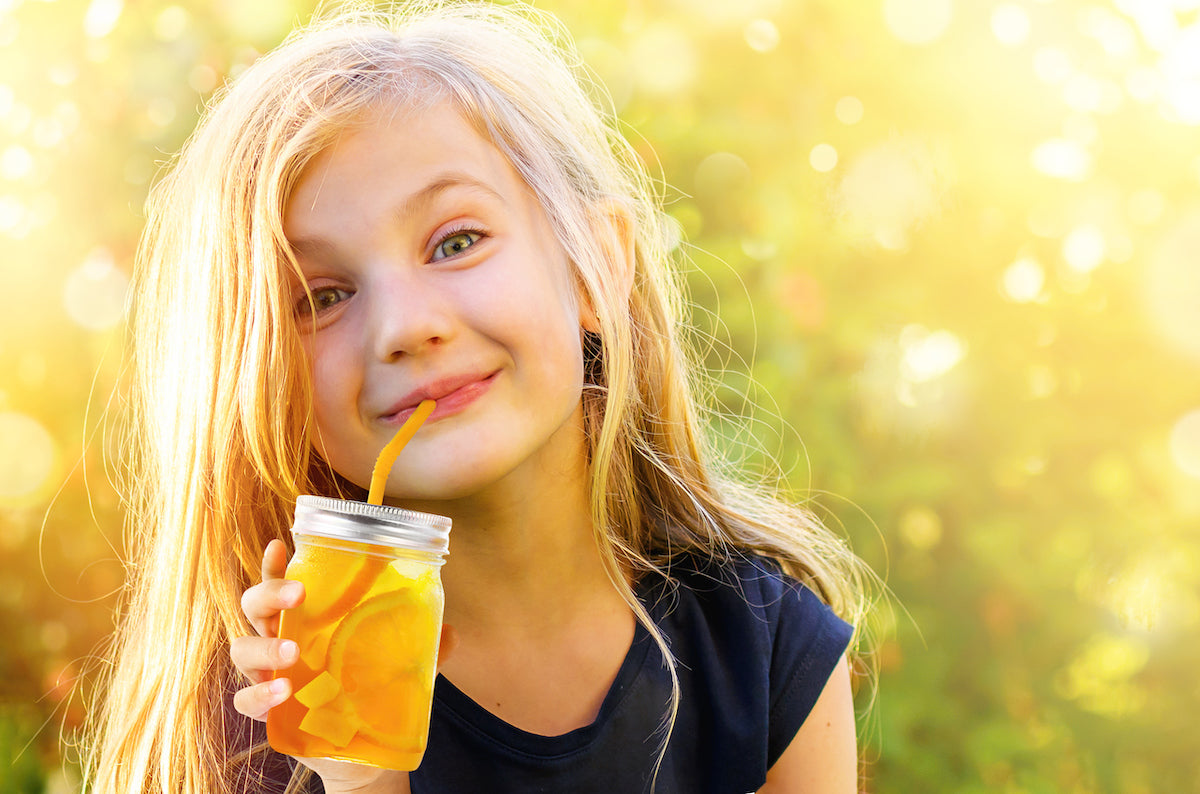You want your kids to be safe and healthy. So you do everything you can to make sure that happens…but it’s not always easy to get them to play along.
Kids can be fussy about everything from the foods they won’t eat to the pills they won’t take. And since being healthy can feel boring or yucky to them, you need to get creative.
Because the truth is that your kids face threats to their physical and mental health every day. Pesticides on the playground. Bad air quality. Whichever virus is going around. Mean kids. All of that can take a toll on your children. And it’s up to you to give them all the tools and support their bodies need to thrive despite everything they’re facing.
Here are five covert ways to keep your kids healthy, making sure they get all the good stuff in without resistance.
1. Use Hydration Tricks
It can be tough to get your children to drink plenty of water, but they need it—especially when they’re active. Every cell in the body relies on water to function. And without enough water, their cells and organs can’t work properly. They need water for everything from digestion to breathing to blood circulation.
So you may need to rely on some tricks to keep them well hydrated. Here are some of the best tips to get kids excited about drinking water.
- Use their favorite frozen fruit as ice cubes or make fruit-infused water.
- Make fun shaped ice cubes, from unicorns to Darth Vader to footballs.
- Give them a special cup, straw, or water bottle to use.
- Create games related to drinking water. For example, every time someone says a code word, like hello, they take a drink.
Using these covert methods to get more water into your kid will help them build a water habit. And that can help keep them healthy for their whole lives.

2. Sneak in Prebiotic Fiber
Prebiotics are special kinds of fiber that nourish the beneficial bacteria—probiotics—in your child’s gut microbiome. They’re abundant in plant foods, but your kid would have to eat a whole farmer’s market every day to get enough prebiotic fiber through diet alone. And it can be hard enough to get them to eat even a few servings, so prebiotic supplements are a must.
The main job of prebiotics is feeding probiotic gut bacteria, but they provide tons of proven benefits that can keep your kid healthy. Among many other things, research shows that prebiotics support:
- proper balanced immune function[1]
- healthy digestion[2]
- sound sleep[3]
- positive moods[4]
- healthy stress management[5]
- attention and focus[6]
- complete nutrient absorption[7]
The trick lies in providing prebiotic fiber that nourishes probiotic bacteria without causing any stomach upset for your kid. And that calls for specific prebiotics known to be gentle on the digestive system such as fructooligosaccharides (FOS), galactooligosaccharides (GOS), and xylooligosaccharides (XOS).[8]
3. Make Exercise Just Plain Fun
The easiest way to sneak those in? Use a proven prebiotic drink mix that gives your kid’s water a sweet fruity flavor (without the bad stuff like fillers and sugar) and plenty of fiber.
A lot of kids get turned off by the idea of “boring” exercise. The word conjures up running laps, doing pushups, and other stuff that doesn’t feel like fun. But you know how important exercise is for your children’s overall health…and how vulnerable they are to chronic health problems like obesity, heart problems, and type 2 diabetes without enough activity.[9]
Turn family activities into fun physical activities that include exercise…but don’t feel like a chore. Examples include things like:
- treasure hunt hikes
- swimming or bike races
- spontaneous dance parties
- family games like tag or touch football
Making movement a fun, creative part of every day will transform exercise into a lifelong healthy habit.

4. Prioritize Down Time For Your Kids to De-stress
Research shows that millions of kids suffer from anxiety.[10] And that’s not really surprising when you think about everything they have to deal with. From active shooter drills to academic pressure to social media, potential stressors are everywhere.
Kids may not even realize they’re stressed and anxious, and their symptoms may not be what we expect those emotions to look like; they may seem more like physical or behavioral issues such as:
- stomach aches
- headaches
- irritability
- aggression or “acting out”
- excessive crying
- trouble sleeping
- fear of being away from you
You can help your child manage anxiety on the sly by introducing self-care and relaxation techniques into their daily routine. Practices like box breathing (inhale, hold, exhale, hold), meditation, yoga, and mindfulness will serve your children well, and teaching them to take space early on will make it an integral part of their life for better emotional health.
5. Hide Probiotics In Their Favorite Foods
It can be hard to get kids to take probiotics, but these beneficial bacteria are the #1 secret to keeping them healthy…and that includes their mental health.
Your child’s gut microbiome—the trillions of bacteria in their gut—shape, direct, and support their immune system from day one.[11] In a well-balanced gut microbiome, beneficial probiotic bacteria vastly outnumber harmful pathogens. And those probiotic bacteria provide dozens of critical health benefits including:
- producing essential nutrients such as B vitamins…and even protective antioxidants[12]
- increasing protein absorption and utilization[13]
- keeping your child’s whole digestive system healthy and regular[14]
- producing brain chemicals (neurotransmitters) like serotonin and GABA that promote calm, happy moods[15]
- helping your child experience quality sleep[16]
- supporting healthy immune system function and response[17]
All of these health benefits—and many, many more—come from a well-balanced gut microbiome.[18] So it’s important to keep your kid’s gut in healthy balance with clinically proven spore probiotics. And it’s easier than you think to get your children to take them. That’s because the right spore probiotics can stand up to heat, cold, and virtually any conditions that regular probiotics can’t.
So you can cook them, bake them, even freeze them, and they’ll still be 100% alive and ready to work as soon as they hit your kid’s gut. That means you can sprinkle them in a PB&J that will sit in a lunchbox for hours. Bake them into oatmeal cookies. Mix them into pancake batter. Freeze them in fruit pops. Sneak them into mac-and-cheese. And those hearty spore probiotics will still work 100% effectively every time.
Covertly Help Your Kids Just Thrive
At Just Thrive, we know how hard you work to keep your children healthy and safe, and we want to make that easier for you.
Your child’s gut microbiome sets the stage for their wellness, so it’s extra important to keep it in healthy balance all year round. And your best tools for making that happen are Just Thrive Prebiotic and Just Thrive Probiotic & Antioxidant.
Just Thrive Prebiotic contains an exclusive blend of FOS, GOS, and XOS designed to nourish a diverse population of beneficial bacteria in your child’s gut microbiome and deliver dozens of general health benefits.
For your child age 4+, mix ½ scoop in their water or favorite beverage every day for a week, then increase to 1 full scoop daily. Then simply let them sip all day long for a healthy helping of proven prebiotic fiber.
Just Thrive Probiotic & Antioxidant contains four clinically proven spore probiotic strains studied extensively in children:
- Bacillus subtilis HU58™
- Bacillus indicus HU36™
- Bacillus clausii
- Bacillus coagulans
This team of spore probiotics allow a wide variety of beneficial bacteria to flourish, crowding out unwanted strains and supporting overall health and wellness. And every capsule can be safely added to any recipe—hot or cold—without losing effectiveness.
Or…if your kids prefer…Just Thrive Probiotic & Antioxidant also comes in a fruity gummy form. Just Thrive Probiotic Gummies contain the same proven probiotic strains, with the added benefit of being extra easy and tasty to take.
Add Just Thrive Prebiotic and Just Thrive Probiotic & Antioxidant into your children’s daily routine today to keep them safe and healthy every day.
>> Support your child’s best health with our Prebiotic / Probiotic Bundle and save.
And if you’re unsure about trying Just Thrive Prebiotic and Just Thrive Probiotic & Antioxidant, we can help.
EVERY Just Thrive purchase is covered by our Bottom of the Bottle, 100% money back guarantee.
That means you can try Just Thrive Prebiotic and Just Thrive Probiotic to see how well they work for your child…and we’re betting that you’ll notice a positive difference.
But if for any reason you’re not completely satisfied, you can ask for a full refund at any time. Even if it’s 3 months or 3 years later. Even if the bottle is empty! You’ll get your money back any time, no hassles, no hard feelings.
>> Tap here to try the Core Health bundle RISK FREE, and save 15% with a subscription.
Sources
- Davani-Davari D, Negahdaripour M, Karimzadeh I, Seifan M, Mohkam M, Masoumi SJ, Berenjian A, Ghasemi Y. Prebiotics: Definition, Types, Sources, Mechanisms, and Clinical Applications. Foods. 2019;8(3):92. doi:10.3390/foods8030092.
- Camilleri M. Human Intestinal Barrier: Effects of Stressors, Diet, Prebiotics, and Probiotics. Clin Transl Gastroenterol. 2021;12(1):e00308. doi:10.14309/ctg.0000000000000308.
- Thompson RS, Roller R, Mika A, Greenwood BN, Knight R, Chichlowski M, Berg BM, Fleshner M. Dietary Prebiotics and Bioactive Milk Fractions Improve NREM Sleep, Enhance REM Sleep Rebound and Attenuate the Stress-Induced Decrease in Diurnal Temperature and Gut Microbial Alpha Diversity. Front Behav Neurosci. 2017;10:240. doi:10.3389/fnbeh.2016.00240.
- Ansari F, Pourjafar H, Tabrizi A, Homayouni A. The Effects of Probiotics and Prebiotics on Mental Disorders: A Review on Depression, Anxiety, Alzheimer, and Autism Spectrum Disorders. Curr Pharm Biotechnol. 2020;21(7):555-565.
- Schmidt K, Cowen PJ, Harmer CJ, Tzortzis G, Errington S, Burnet PW. Prebiotic intake reduces the waking cortisol response and alters emotional bias in healthy volunteers. Psychopharmacology (Berl). 2015;232(10):1793-1801. doi:10.1007/s00213-014-3810-0. Epub 2014 Dec 3.
- Serra MC, Nocera JR, Kelleher JL, Addison O. Prebiotic Intake in Older Adults: Effects on Brain Function and Behavior. Curr Nutr Rep. 2019 Jun;8(2):66-73. doi: 10.1007/s13668-019-0265-2. PMID: 30888666.
- Whisner CM, Castillo LF. Prebiotics, Bone and Mineral Metabolism. Calcif Tissue Int. 2018;102(4):443-479. doi: 10.1007/s00223-017-0339-3. Epub 2017 Oct 27.
- Pham VT, Calatayud M, Rotsaert C, Seifert N, Richard N, Van den Abbeele P, Marzorati M, Steinert RE. Antioxidant Vitamins and Prebiotic FOS and XOS Differentially Shift Microbiota Composition and Function and Improve Intestinal Epithelial Barrier In Vitro. Nutrients. 2021;13(4):1125. doi: 10.3390/nu13041125.
- Anderson E, Durstine JL. Physical activity, exercise, and chronic diseases: A brief review. Sports Med Health Sci. 2019 Sep 10;1(1):3-10. doi: 10.1016/j.smhs.2019.08.006.
- CDC. Anxiety and Depression in Children: Get the Facts. Centers for Disease Control and Prevention. Updated March 8, 2023. Accessed August 23, 2023. https://www.cdc.gov/childrensmentalhealth/features/anxiety-depression-children.html.
- Gaufin T, Tobin NH, Aldrovandi GM. The importance of the microbiome in pediatrics and pediatric infectious diseases. Curr Opin Pediatr. 2018 Feb;30(1):117-124. doi: 10.1097/MOP.0000000000000576.
- Yoshii K, Hosomi K, Sawane K, Kunisawa J. Metabolism of Dietary and Microbial Vitamin B Family in the Regulation of Host Immunity. Front Nutr. 2019;6:48. doi: 10.3389/fnut.2019.00048.
- Jäger R, Purpura M, Farmer S, Cash HA, Keller D. Probiotic Bacillus coagulans GBI-30, 6086 Improves Protein Absorption and Utilization. Probiotics Antimicrob Proteins. 2018;10(4):611-615. doi: 10.1007/s12602-017-9354-y.
- Saulnier DM, Riehle K, Mistretta TA, Diaz MA, Mandal D, Raza S, Weidler EM, Qin X, Coarfa C, Milosavljevic A, Petrosino JF, Highlander S, Gibbs R, Lynch SV, Shulman RJ, Versalovic J. Gastrointestinal microbiome signatures of pediatric patients with irritable bowel syndrome. Gastroenterology. 2011 Nov;141(5):1782-1791. doi: 10.1053/j.gastro.2011.06.072. Epub 2011 Jul 8.
- Strandwitz P. Neurotransmitter modulation by the gut microbiota. Brain Res. 2018 Aug 15;1693(Pt B):128-133. doi: 10.1016/j.brainres.2018.03.015.
- Li Y, Hao Y, Fan F, Zhang B. The Role of Microbiome in Insomnia, Circadian Disturbance and Depression. Front Psychiatry. 2018;9:669. doi: 10.3389/fpsyt.2018.00669.
- Zheng D, Liwinski T, Elinav E. Interaction between microbiota and immunity in health and disease. Cell Res. 2020;30(6):492-506. doi: 10.1038/s41422-020-0332-7.
- Yin R, Kuo HC, Hudlikar R, Sargsyan D, Li S, Wang L, Wu R, Kong AN. Gut microbiota, dietary phytochemicals and benefits to human health. Curr Pharmacol Rep. 2019;5:332-344. doi: 10.1007/s40495-019-00196-3. Epub 2019 Aug 19.










